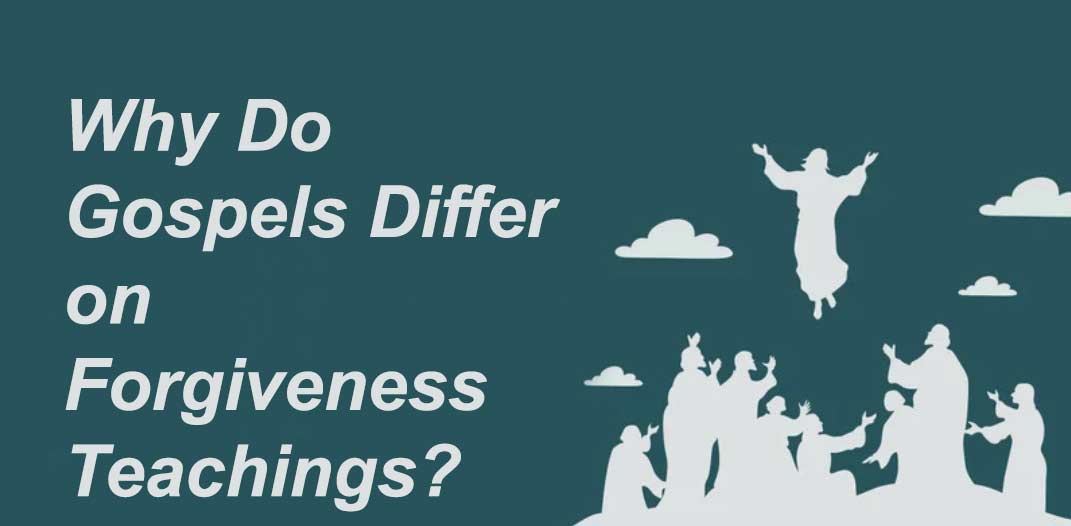Have you ever noticed that the stories in the New Testament about Jesus's life and his lessons on forgiveness are not all the same? It's interesting to see how each of the four books—Matthew, Mark, Luke, and John—gives a different angle on this key moral concept. When looking closely at these texts, you'll find that each one has unique insights and subtleties that make us think more deeply about the idea of forgiving others.
The differences in the teachings show that there's more to forgiveness than we might initially think. It's not just a simple rule to follow; it's a complex idea that can change depending on the situation and the person. For example, Matthew emphasizes the need to forgive others if we want to be forgiven, while Luke adds the idea that we should be generous in our forgiveness.
Understanding why these stories differ can help us grasp the bigger picture of what forgiveness means in our lives. Instead of just hearing 'forgiveness is good,' we get to see how it can be applied in different ways and in different contexts. This can help us be better at forgiving in our own lives.
In today's fast-paced world, taking the time to reflect on these teachings can provide a moment of quiet reflection and personal growth. We can learn a lot from the way Jesus approached forgiveness, and these lessons are just as relevant now as they were two thousand years ago.
Forgiveness is not just about saying 'I forgive you,' it's about genuinely letting go of grudges and moving forward, both for our own peace of mind and for the sake of others.
So next time you read through the New Testament, pay attention to the details. You might find something new that speaks to you about how to live a more forgiving life.
'Forgiveness is the fragrance that the violet sheds on the heel that has crushed it.' — This quote reminds us that the act of forgiving can be a powerful and healing force, even when it feels most difficult.
Key Takeaways
Have you ever wondered why the stories in the New Testament concerning Jesus's teachings on forgiveness differ? It's quite fascinating to note that Matthew, Mark, Luke, and John each present a unique perspective on this fundamental moral principle. A close examination of these texts reveals distinct nuances that prompt us to contemplate the nature of forgiveness more deeply.
The variance in these teachings suggests that forgiveness is a nuanced concept, not merely a straightforward command to obey. It's an intricate notion that varies by context and individual. For instance, Matthew underscores the necessity of forgiving others to receive forgiveness ourselves, whereas Luke encourages us to be liberal in offering forgiveness.
Appreciating the reasons for these discrepancies can enhance our understanding of forgiveness's role in our lives. We're provided with examples of how forgiveness can be adapted to various scenarios, which can improve our ability to forgive.
In our modern world, pondering these teachings offers an opportunity for calm introspection and self-improvement. The way Jesus taught forgiveness remains as pertinent today as it was centuries ago.
Forgiveness involves more than uttering the words "I forgive you." It's about sincerely releasing resentments and progressing, benefiting our well-being and our relationships with others.
So, when you next read the New Testament, pay close attention to the specifics. You may uncover fresh insights on leading a life rich in forgiveness.
"Forgiveness is the fragrance that the violet sheds on the heel that has crushed it." This quote illustrates that even in the toughest situations, offering forgiveness can be a potent and restorative act.
The Parable of the Unforgiving Servant
The Parable of the Unforgiving Servant teaches us about the need to forgive. It tells the tale of a servant who, despite being let off a huge debt, wouldn't let go of a small debt owed to him. This story shows us how significant God's forgiveness is and expects us to show the same kindness to others.
The servant didn't understand the mercy he was shown and didn't forgive others in return. This story is a strong call to not only accept forgiveness but to also forgive others. We're asked to think about how we forgive and if we're really living out this value. The story warns us about the harm that can come from holding onto grudges, pushing us to adopt a forgiving mindset, which is what Jesus taught.
Remember, it's not enough to just be forgiven; you need to give forgiveness too. This message is timely, especially in a world where grudges and conflicts can easily arise and escalate. When we let go of resentment and choose to forgive, we make space for healing and peace in our relationships. It's an active choice to forgive, one that can change both our lives and the lives of those around us.
Forgiveness is powerful. It's not always easy, but it's a step towards a more peaceful life and better relationships. This parable is a reminder that we should strive to forgive as freely as we've been forgiven.
Forgiveness in the Gospel of Matthew
The Gospel of Matthew places a strong emphasis on the role of forgiveness in how we interact with others and grow spiritually. It points out in Matthew 6:14-15 that if we forgive people who've wronged us, God will forgive us in return. This shows us how central forgiveness is to our spiritual health.
In Matthew 18:21-22, Jesus gives us a clear indication of how often we should forgive. When Peter asks about the number of times to forgive someone, Jesus says 'seventy-seven times,' indicating that our willingness to forgive should have no limits.
The Gospel also touches on the need for practical forgiveness in our daily lives. For instance, Matthew 5:23-24 tells us to reconcile with anyone we've issues with before we perform religious acts, like giving offerings at the altar. This teaches us that forgiveness is something we need to practice actively, not just think about in theory.
We see this idea illustrated in Matthew 18:23-35 with the story of the unforgiving servant, who's forgiven his debt but refuses to forgive another's. This story serves as a reminder of the necessity of forgiving others as we've been forgiven.
In writing this, I also want to remind you that forgiveness isn't just a religious principle but a practice that can lead to healthier relationships and personal peace. 'To err is human, to forgive divine,' as the saying goes, and carrying out this practice can be transformative for both the one who forgives and the one forgiven.
Forgiveness in the Gospel of Mark
In the Gospel of Mark, we see a strong focus on the importance of forgiveness, which is evident through the stories and teachings of Jesus. One key story is when Jesus heals a man who can't walk, but he also forgives his sins, showing that he cares about both physical health and spiritual healing.
Mark's Gospel also teaches that forgiving others is necessary if we expect to be forgiven by God. Jesus advises in Mark 11:25 that when we pray, we should forgive anyone we hold a grudge against, so that God will forgive our own mistakes.
The idea is that by forgiving others, we clear the way for our own forgiveness. This makes forgiveness not just a kind gesture, but a crucial part of spiritual well-being and growth.
Forgiveness: It's not just about saying 'I forgive you.' It's about letting go of resentment so that we can move forward, both in our relationships with others and in our relationship with God. 'And if you have anything against anyone, forgive them, so that your Father in heaven may also forgive your wrongdoings.' (Mark 11:25)
In today's world, where conflicts can easily arise and grudges can be held onto, this message from Mark's Gospel is especially relevant. It tells us that forgiveness is a process that helps us heal and become better people. It's a reminder that, in order to grow spiritually, we need to be willing to let go of our past hurts and look to the future with a compassionate heart.
Forgiveness in the Gospel of Luke
In the Gospel of Luke, the emphasis on forgiveness is a central theme that speaks to the heart of human relationships and divine grace. For instance, the parable of the Prodigal Son is a powerful story that shows a father's limitless love and willingness to forgive his returning son, mirroring the forgiveness God extends to those who are truly sorry for their mistakes. Luke's audience lived in a time where forgiveness wasn't just a personal issue but one that affected entire communities. His writings tell us that forgiving others can repair bonds and promote peace within society.
Understanding the stories and the historical setting of Luke's Gospel helps us realize the enduring wisdom on forgiveness and mending broken ties. These lessons remain relevant, encouraging us to let go of grievances and support one another in our collective journey toward harmony.
Forgiveness isn't just about healing ourselves, but also about healing our communities. It's a vital component of living well together, an insight that Luke's Gospel brings beautifully to life.
In today's often divided society, where grudges and resentment can fester, Luke's message of forgiveness is especially poignant. It teaches us that everyone makes mistakes, but the willingness to forgive can transform lives and communities.
In short, the Gospel of Luke offers timeless wisdom on the importance of forgiveness and the positive change it can bring to our lives and our world.
Custom Quote:
'Forgiveness is the fragrance that the violet sheds on the heel that has crushed it.' – Mark Twain
Forgiveness in the Gospel of John
Forgiveness is a key theme in the Gospel of John, showing how letting go of grudges and choosing to be compassionate can change a person's life. In this gospel, trusting in Jesus is closely tied to receiving forgiveness and the promise of life after death. This underscores the deep link between forgiving others and repairing one's connection with God.
In the stories told by John, we see forgiveness as a stepping stone to mending relationships. We read about Jesus forgiving Peter after he denied him, and the mercy shown to a woman who was about to be punished for adultery. These stories show how forgiveness can mend broken bonds. Jesus's own words in John stress how crucial forgiveness is for living in harmony with people around us and with God.
The Gospel of John teaches us that believing in Jesus is foundational for healing relationships and reconnecting with others. Forgiveness is portrayed as a way to experience spiritual refreshment and strengthen our bonds with God and our fellow humans.
Forgiveness: The Heart of Healing in John's Gospel
Forgiveness isn't just a nice thing to have; it's essential for healing and for getting back on good terms with God and those around us. The Gospel of John doesn't just tell us this; it shows us through vivid stories and teachings of Jesus. It's about a fresh start and a stronger bond with the divine and with each other.
Custom Quote: 'In the tender act of forgiveness, we find the path to true peace and a renewed bond with the divine.'




